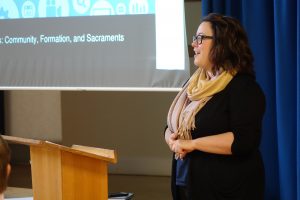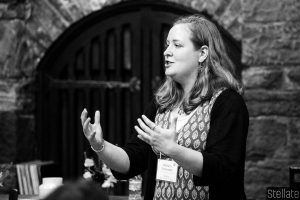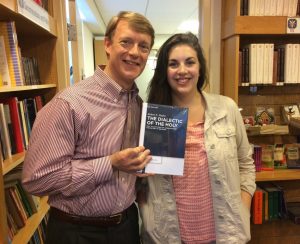Karen O’Donnell
I completed my PhD in Theology & Religion at Exeter University in April 2016. My research focused on the impact of trauma on theological discourse. When I reflect back on my time at Exeter I wish I hadn’t been in such a rush to finish my research! I found the department to be such a friendly and collegiate place. I really enjoyed getting to know all the various members of staff and students and I know my time there prepared me very well for life after the PhD. The opportunities I had for sharing and developing my research alongside the teaching I did whilst studying was so helpful in broadening my experience beyond just the PhD.
Before I finished my doctoral studies, I had already been appointed as a Research Fellow at Durham University. I took up this appointment less than a month after my viva! My role here at Durham is based in CODEC which is a research centre for digital theology. I’ve spent the last year researching whether you can (or should!) train to be a vicar (mostly) online. I think the answer is yes but that it requires some shifts in our theological thinking about digital spaces. I’ve been researching the nature of our corporeality in digital spaces in order to challenge the idea that when we go ‘online’ we become disembodied. This research will be published as a journal article later this year. Earlier this year I signed a contract with SCM Press to publish a version of my doctoral thesis as a monograph, so I’ll be spending the upcoming summer editing that and getting it ready for publication.
doctoral studies, I had already been appointed as a Research Fellow at Durham University. I took up this appointment less than a month after my viva! My role here at Durham is based in CODEC which is a research centre for digital theology. I’ve spent the last year researching whether you can (or should!) train to be a vicar (mostly) online. I think the answer is yes but that it requires some shifts in our theological thinking about digital spaces. I’ve been researching the nature of our corporeality in digital spaces in order to challenge the idea that when we go ‘online’ we become disembodied. This research will be published as a journal article later this year. Earlier this year I signed a contract with SCM Press to publish a version of my doctoral thesis as a monograph, so I’ll be spending the upcoming summer editing that and getting it ready for publication.
This post has given me opportunity to present my research internationally and to meet fascinating people doing really interesting work from around the world. Whilst it is primarily a research position, I have also had the opportunity to teach here at Durham and in various other contexts. In the coming months I’m excited about developing my work in digital theology more deeply. My research is moving into considering sacramentality in digital spaces—a really juicy topic! I know my time at Exeter prepared me so well for the joys and the difficulties of academic life—I can’t think of a better place to have taken my first steps into this world.
Bethany Sollereder
In a rather odd move, I went from my PhD in theology to working at the Materials Department at Oxford University. In a slightly confusing job, I work for the materials department where I consult for the Templeton World Charity Foundation. It has been a job full of cool opportunities: conferences around the world, meeting and helping fabulous researchers who are doing cutting edge work in science and religion, and being able to promote interesting lines of theological scholarship, including the “Practical Theodicy” project being run by Prof. Christopher Southgate. The job has non-stop travel (since January, I’ve been to Canada, the Bahamas, New Zealand, New York, Athens, and more locally Edinburgh and Canterbury) and sometimes the travel has been through unusual means. I never knew I would learn to co-pilot a single engine plane, for example. I also started tutoring for the faculty of Theology and Religion about a year and a half ago, so life has been a nice mix of scholarship, travel, and teaching.
rather odd move, I went from my PhD in theology to working at the Materials Department at Oxford University. In a slightly confusing job, I work for the materials department where I consult for the Templeton World Charity Foundation. It has been a job full of cool opportunities: conferences around the world, meeting and helping fabulous researchers who are doing cutting edge work in science and religion, and being able to promote interesting lines of theological scholarship, including the “Practical Theodicy” project being run by Prof. Christopher Southgate. The job has non-stop travel (since January, I’ve been to Canada, the Bahamas, New Zealand, New York, Athens, and more locally Edinburgh and Canterbury) and sometimes the travel has been through unusual means. I never knew I would learn to co-pilot a single engine plane, for example. I also started tutoring for the faculty of Theology and Religion about a year and a half ago, so life has been a nice mix of scholarship, travel, and teaching.
However, it is now time to move on, and in September I will take up at two year research position in Theology here in Oxford, as one of the 12 globally-placed St Andrews Fellows in Science and Religion. I will be trying to develop a “compassionate theodicy”—attempting to reorient the purpose of theodicy away from the dispassionate intellectual exercise that now exists, which is a set of arguments lobbed between Christian philosophers and their sceptical atheist or agnostic counterparts, and see if theodicy can be moved towards something that could help Christian believers who are struggling with faith in times of suffering.
Reflecting back on my time in Exeter, I continue to be amazed by the quality of my supervision. It was an extremely warm and caring environment, and I never felt “lost” in the system. Rather, there was a sense of rich collegiality between the faculty and the students, aided by events like regular morning trips for coffee. My supervisor, Chris Southgate, was fabulously generous with his time and even rewrote two courses that we taught together, just so that they would incorporate my interests (“More Bible! More history!”). The PhD was hard work—desperately difficult at times—but Exeter was a great place to do it. Looking back, there is no other programme in the world I would have gone for instead.
Robert Meditz
I have never written a book before, and did not know what to expect, and did not know whether a publisher would be interested in my dissertation on Paul Tillich and Judaism, which carried the title Dialectic of the Holy: Paul Tillich’s Idea of Judaism within the History of Religion. One thing that worked in my favor is that I gave a short paper on one of the core arguments from my dissertation at a small Tillich conference in Oxford in July of 2014, the day before I graduated from Exeter. My paper was selected to be in the conference proceedings, to be published by DeGruyter (my book came out before the conference proceedings!). So I was on the “radar screen” of DeGruyter.
my dissertation at a small Tillich conference in Oxford in July of 2014, the day before I graduated from Exeter. My paper was selected to be in the conference proceedings, to be published by DeGruyter (my book came out before the conference proceedings!). So I was on the “radar screen” of DeGruyter.
I submitted a book proposal in January of 2015, and received a contract within about 30 days, and was asked to submit revisions by September of 2015. They were flexible in extending that deadline by about 30 days, and the substantive form of the manuscript was completed by year end 2015. It got quiet for a while after that, and by the spring of 2016 I was reading galley proofs, and after about four rounds of proofreading, I gave permission to print the final copy in July of 2016. The book was published in September of 2016, about one month later than the estimate in the original contract. I had to construct my own index, and I’m glad I put the time into that. My book is very “conceptual,” so there was a lot of cross-referring back and forth between some terms. The most difficult part of the proofreading was converting the UK format on the use of single and double quotes to the U.S. format – ugh! But it all worked out nicely in the end. I thought DeGruyter was great, and I am very pleased to have published with them.
